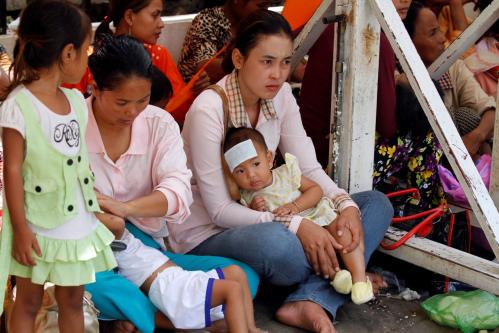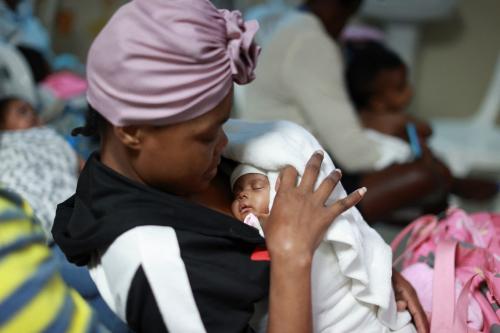Around 40 million people worldwide are infected with HIV, 95 percent of whom live in developing countries. AIDS is the leading cause of death in Africa and the fourth-leading cause of death worldwide. In a world of plenty, it becomes increasingly unacceptable that people die or suffer because they have no access to even the most basic of medical care. Equally unacceptable is when poverty is the result of large or catastrophic health expenditures. Evidence suggests that more than 150 million people globally suffer financial catastrophe every year due to out-of-pocket health expenditures. Perpetual poverty due to the inability to work because of ill health (such as secondary illness as a result of HIV infection) goes hand in hand with this scenario. This downward spiral of impoverishment and poor health can only be halted through improved health financing mechanisms. Constrained government budgets for health, however, are a serious problem in many developing countries. Currently, private (mostly out-of-pocket) health expenditures are a major source of revenues which are being crowded out by government expenditures. Offering low-cost health insurance to low-income households is one innovative method through which to finance health care provision, guarantee treatment of HIV/AIDS and avoid catastrophic out-of-pocket health expenditures.
The Dutch NGO PharmAccess is currently developing low-income health insurance products for a variety of low-income workers in Africa. They began in 2004 with workplace programs in large international companies, providing comprehensive health insurance for the workers, including HIV/AIDS counseling and treatment and treatment of tuberculosis and malaria. PharmAccess develops contracts between insurers and providers, to guarantee easily accessible and high quality care. This approach is currently being implemented in about thirty African countries. The schemes provide an easy mechanism for donor support to subsidize the insurance premiums, without risking the crowding-out of existing public or private resources. Group insurances are being developed for farmer co-ops, participants of micro-finance schemes, market women, fishermen co-ops, small ICT enterprises, organized coffee growers, and other target groups. In all cases, the benefit levels are tailored to the needs of the target groups. With the aid of a grant from the Dutch government, insurance premiums are subsidized for the first few years to entice even low income households to participate in these new schemes. The steady income flow from these pre-paid schemes allows providers to invest in improvements of health care infrastructure.
At Brookings, we are involved in the research for two components of these programs: 1) an analysis of the willingness to pay for such health insurance schemes which provide HIV/AIDS counseling and treatment and; 2) an evaluation of the impact of these insurance schemes on health care utilization, including access to HAART and a host of behavioral responses, including consumption and savings patterns, labor supply and investment in human capital. The first component addresses the challenge of providing insurance coverage, not just to workers at large and international companies, but also for workers in small and local companies and for the self-employed. Determining the demand or willingness-to-pay for the schemes is crucial in ascertaining their feasibility, establishing prices, and setting potential subsidy levels. Baseline and follow-up surveys in the PharmAccess program countries gather data on willingness-to-pay for health insurance. In a recent study using contingent valuation (CV) method, which directly elicits from individuals how much they would be willing to pay for a health insurance scheme such as the one being offered by PharmAccess, it was shown that in Namibia 87 percent of the uninsured respondents were willing to join the scheme and that the poor are willing to pay up to 5 percent of their income on health insurance (Asfaw, A., E. Gustafsson-Wright and J. van der Gaag. Willingness to Pay for Health Insurance: An Analysis of the Potential Market for Health Insurance in Namibia, forthcoming). These types of health insurance schemes have the potential to provide individuals including those who are infected with HIV with necessary anti-retroviral treatment allowing them to continue to be productive members of society and protecting them against the negative financial shock of having to face large health care expenditures.
The Brookings Institution is committed to quality, independence, and impact.
We are supported by a diverse array of funders. In line with our values and policies, each Brookings publication represents the sole views of its author(s).



Commentary
Op-edLow-Cost Health Insurance in Africa Provides the Poor with Antiretroviral Drugs
November 29, 2007